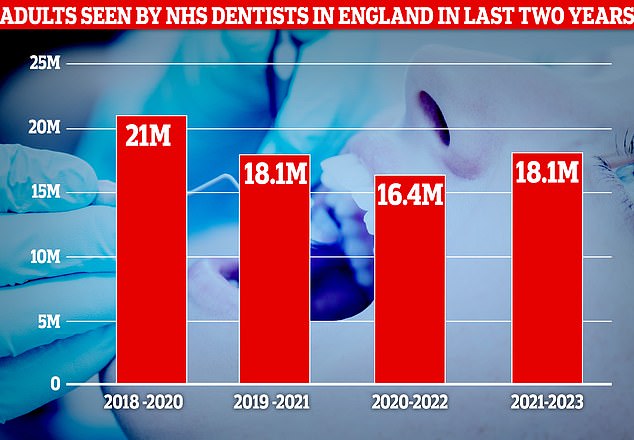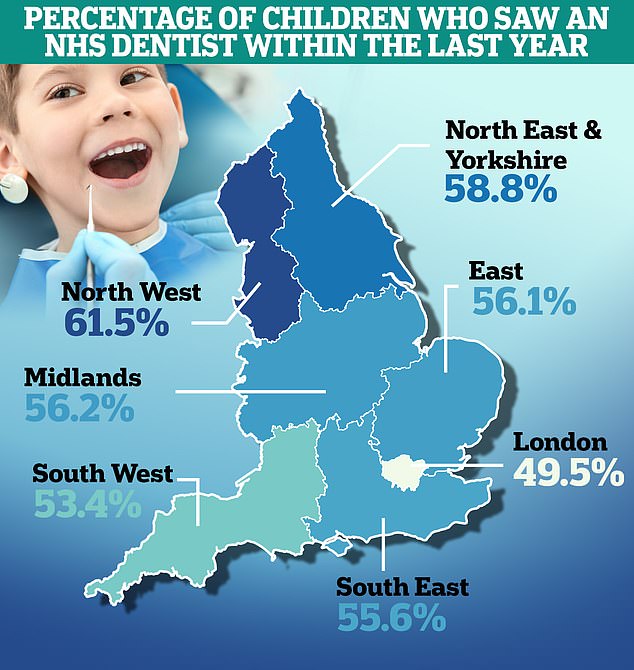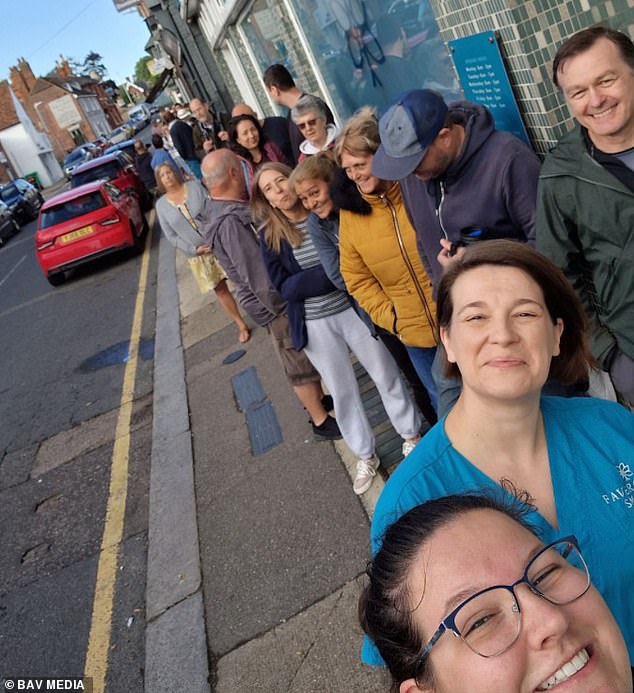Britain’s dental crisis exposed: A QUARTER OF ADULTS have put off seeking dental care or treatment because of the cost (and the same number don’t brush twice a day…)
A quarter of adults have postponed dental care or treatment because of the costs, according to an official survey.
One in three also say the cost of dentistry affects the type of care or treatment they receive, while a quarter fail to brush their teeth at least twice a day.
The poll included 6,343 responses from 4,429 households in England and was commissioned by the Government’s Office for Health Improvement and Disparities.
Overall, 66 percent of people said they had very good or good oral health, 26 percent said it was fair and 7 percent said it was poor or very poor.
The findings come a month after a damning report from the Nuffield Trust, a health think tank, warned that NHS dentistry is ‘gone for good’ and must be rationed for those most in need.
One in three also say the cost of dentistry affects the type of care or treatment they receive, while a quarter fail to brush their teeth at least twice a day. The poll included 6,343 responses from 4,429 households in England and was commissioned by the Government’s Office for Health Improvement and Disparities. The latest figures show that just 43 per cent of over-18s were seen by a dentist in the 24 months to June this year, compared to more than half in the same period before the pandemic hit

A total of 18.1 million adults visited their dentist in the two years to June 2023, up from 16.4 million in the 24 months to June 2022. But this is still well below 21 million in the two years to June 2020.
It described it as the most dangerous point in its 75-year history and said patients must undergo a means test if it is to survive at all.
Patients have told of their failure to find an NHS dentist, with some resorting to extracting their own teeth after enduring crippling pain.
The new research shows that only 63 percent of people go to the dentist for regular checkups, 15 percent go occasionally and 18 percent only go if they have problems with their mouth, teeth or dentures.
Meanwhile, almost half of all adults (47 percent) have had problems with their teeth in the past year, with 28 percent saying they have felt self-conscious, 24 percent finding it uncomfortable to eat food and 20 percent experiencing agonizing pain in their teeth. mouth.
One in five had a serious impact that affected their daily life in the previous 12 months, such as avoiding smiling, laughing and showing teeth, and difficulty eating (9 percent).
Overall, the poll found that 77 percent of people with natural teeth brushed their teeth at least twice a day and 59 percent used an electric toothbrush.
The Department of Hearth and Social Care published its 2022/2023 annual accounts yesterday, showing it has spent £2.9 billion on NHS dentistry.
The British Dental Association says this means the NHS dental budget has fallen by a third in real terms since 2010, amounting to a £1 billion cut.
Eddie Crouch, chairman of the BDA, said: ‘Ministers must explain why – when desperate patients are pulling out their own teeth – they have allowed funding for NHS dentistry to fall off a cliff.
‘Promised ring fences have been demolished around a budget that had already been cut to the bone.
‘The Prime Minister promised to ‘fix’ NHS dentistry. Instead, he takes it back in time.”
The OHID study was conducted in 2021 but published today.
Brett Hill, head of health and protection at consultancy Broadstone, said: ‘Today’s national dental statistics reveal the declining oral health of the UK population and a worryingly high number failing to have regular dental checks.
‘Since the pandemic there have been numerous reports of people struggling to access NHS dental care or afford the high costs of private dental treatment.
‘The cost of living crisis has only exacerbated the problem, with a significant proportion citing dental costs as the reason they haven’t visited the dentist.
‘Dental problems can have a significant effect on an individual’s wider health, from increasing physical and mental stress to increasing the risk of more serious conditions such as cardiovascular disease.

The NHS’s children’s dental services have also suffered, with only 56 per cent visiting a dentist in the last year, 700,000 fewer than before the pandemic

Last year, Leigh, in Greater Manchester, joined a growing list of communities where struggling patients were queuing from dawn to access a dentist. It follows reports from Faversham, in Kent, where one practice received 27,000 calls for just 60 NHS slots. Pictured: the queue outside Faversham Smiles dental practice in August 2023
‘Ultimately, they create obstacles to completing daily tasks and working productively and are likely to contribute to the increase in economic inactivity due to long-term illness that hits employers hard.
‘Dental check-ups are also a crucial first line of defense in the fight against oral cancer, the rate of which has risen by 34 percent in the past decade.
‘Given that 53 per cent of oral cancers are not diagnosed until stage 4, it is clear that for some people, a lack of access to regular dental check-ups can have profound consequences.’
A spokesperson for the Department of Health and Social Care said: ‘Access to dentistry is improving – last year 1.7 million adults and around 800,000 more children saw an NHS dentist – and we have also announced plans to increase the number of dental training places increase by 40 percent.
‘We invest £3 billion every year in NHS dentistry and we also take preventative measures such as expanding water fluoridation programs to reduce the number of children with tooth decay.
‘We want every adult and child who needs an NHS dentist to have one, no matter where they live in England.
‘We have already taken steps to improve access and incentivize practices to deliver more NHS dental care, and will include new measures in our Dental Recovery Plan in due course.’
